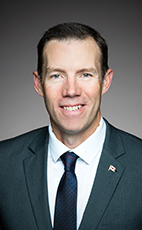Mr. Speaker, it is a pleasure to rise to speak to Bill S-231 and speak in support of my colleague, the member for Louis-Saint-Laurent. Like the member, I was a journalist prior to this career. I was a print journalist for close to 25 years. In fact, I think I still have some ink in my veins. Once people have that, they never lose it.
There are two things I want to focus on as part of the discussion tonight. I know it has been touched on a bit before, but there are two elements of the bill that are vitally important as we move forward. I like to think that my career as a journalist really helped get me where I am right now, which is representing my constituents of Foothills here in the House of Commons. I talked to a lot to the community members. I knew the issues. I knew who the councillors were, and those types of things, but the fundamental reason why the residents of Foothills elected me in 2014, and again in 2015, was that over the years as a journalist I had earned their respect. I had earned their trust, and I believe I earned their faith. Those are so fundamentally important for a journalist, and they transfer well into being an elected official as well.
That is something we are losing in the journalism industry, that respect factor and trust. Part of that is because in this day and age of social media, alternate facts, fake news, and whatever we want to call these things that are happening right now, people are having a difficult time trusting the media that is out there now.
One of the aspects of the bill that is a great step forward is to define journalism and who a journalist is. We are seeing that the focus of journalism has certainly changed over the 20-plus years I was in the industry. Now it is who can get the information out there first, not necessarily who gets it right. That is really the core issue when it comes to Canadians losing faith in journalism.
That is why we have to take those steps to define what journalism is and who a journalist is. That can be discussed further at committee. Certainly, there are many more media to get that information out there, but Canadians have to have faith in who the journalist is and whether they trust the facts he or she is bringing forward.
The other aspect I wanted to touch on especially was the fact about protecting our sources. Carl Bernstein said:
The lowest form of popular culture—lack of information, misinformation, disinformation, and a contempt for the truth or the reality of most people's lives—has overrun real journalism.
That touches on what I was saying about the lack of trust we have in journalism today. That is something the bill will help to address a great deal.
On protecting sources, in my years as a journalist, one of the big issues I dealt with was a magnesium plant that is in my constituency. It was in the circulation area of our newspaper. I was making phone calls from High River to New Orleans, to Dallas, Texas, and to Los Angeles, California. A lot of this had to do with a company many of us remember from the movie Erin Brockovich, Pacific Gas and Electric Company. I was able to track down a lot of corruption that had happened in the building and construction of that operation, which never really became operational. It became a huge white elephant for the Province of Alberta.
I would never have been able to track those things down if my sources did not have faith in me: they knew they would be kept secret. That is such a fundamental part of journalism and the media, but also a fundamental part of our democracy. As journalists, we have to ensure that our sources know they have the faith, trust, and security to come forward with information, whether it is about public spending, about government, about their community, or about misappropriation and misdeeds with businesses and corporations. We have to ensure that sources have that protection.
Many of us in the journalism industry, or even as members of Parliament, were shocked to learn that the Montreal city police and the Quebec provincial police were tapping the phones of journalists to try to track not only their sources but also their movements. Those of us in Canada just did not think something like this would ever happen. However, it has happened, and we have to take steps to ensure it does not happen again.
Take a look at our history. I was inspired to become a journalist because of some of the amazing stories that happened over the years. Take a look at Woodward and Bernstein in Watergate. Look at the Spotlight team at The Boston Globe. It shed a light on the Catholic church in Boston. What about the Liberal ad scam? Some of these things may never have been brought to light if we did not have sources who felt safe coming forward.

